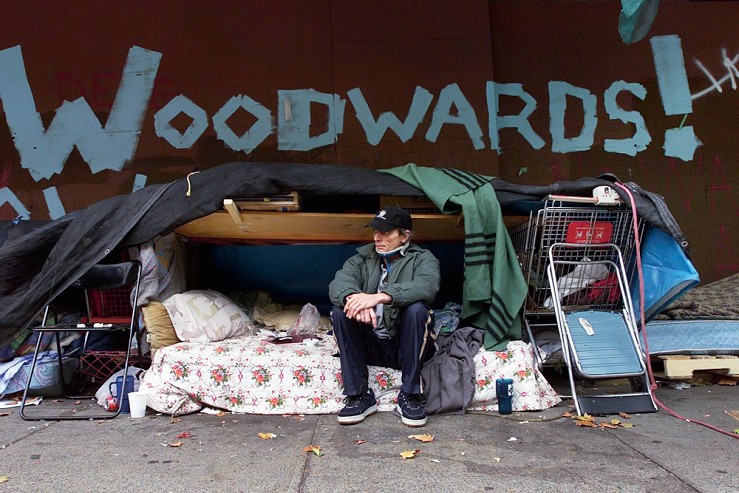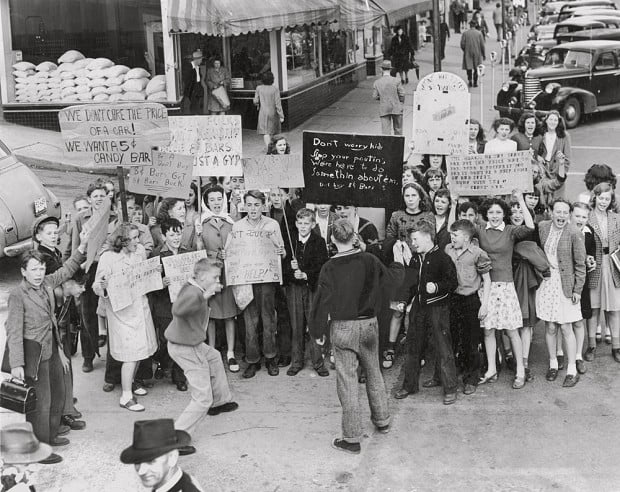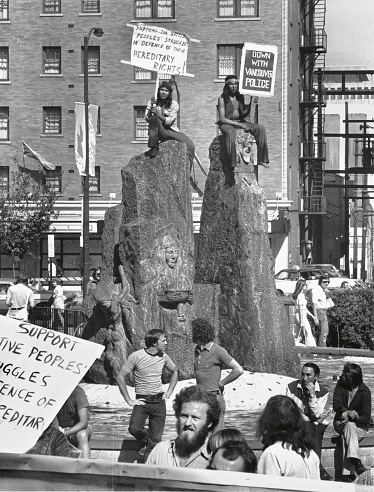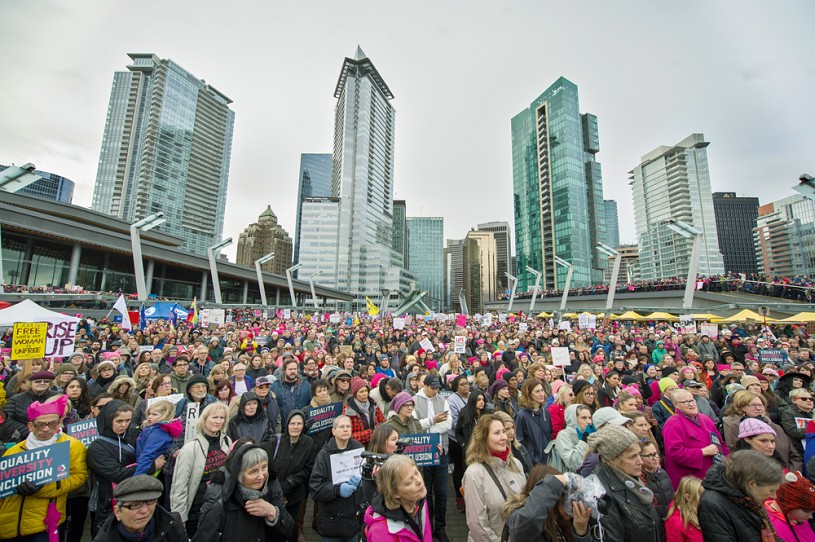- City on Edge
- Greystone Books (2017)
With 4,000 people flooding the lawns and streets outside Vancouver’s City Hall this month to protest a far-right rally and 15,000 people marching against U.S. President Donald Trump’s views on women’s rights in January, it may seem protests are on the rise in Vancouver.
But as author Kate Bird reveals in her new book City on Edge, protest culture has always been a defining part of the city’s history. Bird, who used to manage the photo collection at the Vancouver Sun and Province newspapers, documents the city’s rich protest history over the last 100 years in black-and-white and colour photographs.
The photos cycle through 150 protests — January’s Women’s March, a salmon fishers’ strike in 1900, a First Nations hereditary rights demonstration in 1974, even kids protesting rising chocolate prices in 1947. They offer a look at how protests have evolved in Vancouver since the 1900s.
Bird is also the author of Vancouver in the Seventies. We caught up with her to ask a few questions about the new book.
Tyee: What inspired you to document and share the history of Vancouver’s protest culture?
Kate Bird: “My book Vancouver in the Seventies. When I was researching that, I mentioned to the publishers that there are so many protests in the ’70s we could probably do a whole book on protests. So that kind of started it, and just recognizing how many protests in Vancouver’s history were really significant, that Vancouver was at the vanguard of protest activism for many years.”
From the recent Women’s March to children protesting the spike in chocolate prices, you’ve documented rallies protesting a wide range of topics. Has protest culture changed throughout the years?
“It has changed, but also some things remain the same. Issues such as affordable housing, like back in 1946, when the Second World War veterans occupied the old Hotel Vancouver to protest [the lack of housing] for them after the war. And then of, course there was the “Woodsquat” [occupation of the] Woodward’s building about housing.
“Issues like these are consistent over time, and of course it remains an issue today.”

I can imagine you sifted through quite a lot of photographs before selecting which ones would appear in the collection. Can you tell us about the process you went through?
“It was a difficult process, because I knew about a number of protests and I did research… but then I couldn’t find photographs, especially in the early years when there may have been an article in the newspaper, but there weren’t any photographs with the article. So I tried to just find the photos and go from there. It was a mixture of the two.
“I try representing many of the themes that came from the photos themselves. Such as labour, anti-government protests, peace and anti-nuclear, social justice, the environment, and represent those themes all the way through.”
Was there something that particularly drew you into the photos you ended up selecting for the book?
“I was specifically looking for made-in-Vancouver type protests. There are a lot of global type protests where everyone protested certain things, but there are certain protests that are unique to Vancouver or movement that started here, so [I looked for] things like that that were particularly unique to Vancouver.”
In the book, you write, “Everyone who lives outside of Vancouver thinks it’s peaceful here, but nobody who truly knows (or, I would venture, truly loves) the city falls for that.” Why is Vancouver’s protest history overlooked?
“Things such as the peace movement got started here, and I think a part of that was our alignment with the U.S. and California being somewhat stronger in many ways than it was going east to west, because there was a lot of influence from the U.S. I think that student protests were big here, much more so than in many universities across Canada.
“I think that Vancouverites have always had that kind of edge, whether it was the early labour protests, which were also huge here, and also into the riots and sports and concert riots we are kind of famous for now.”

Did you learn anything new about protest culture? Were you surprised at any point during your research?
“One thing that stuck out to me was how B.C and Vancouver, being so far away from Ottawa, how many protests over the years had people take their issues to Ottawa. There was the On-to-Ottawa trek in 1935, where relief camp men tried to travel to Ottawa to plead their plight of poverty during the Depression. In 1970, the women’s Abortion Caravan travelled all the way to Ottawa to try to repeal the abortion law.”

How have these protests shaped the city we’ve come to know today?
“It’s interesting: one thing somebody said is that people don’t protest anymore when I was telling them I was working on this book. I was thinking, you don’t protest anymore, and many people do, as evidenced by the anti-racism protests just last week, which [brought together] a wide swathe of the community. The peace marches in the 1980s [included] everyone; it was all different parts of society. It wasn’t just young people or just left wing or anything; it was a mix of everyone in the city.”
What can folks take away from this documenting of 100 years of protest history?
“In one way, people can be enlightened about how active Vancouver has always been in protest movement. It’s a big part of our culture and hopefully it will continue to be such into the future, and also for people to think about their own place in protest and whether they might be more interested in participating.”
This interview has been slightly edited for clarity.
Kate Bird will launch City on Edge as part of the Museum of Vancouver’s exhibition on Sept. 29, 2017. Bird will also speak about her collection in a panel reading at the downtown Vancouver Public Library on Oct. 5. ![]()
Read more: Rights + Justice
















Tyee Commenting Guidelines
Comments that violate guidelines risk being deleted, and violations may result in a temporary or permanent user ban. Maintain the spirit of good conversation to stay in the discussion.
*Please note The Tyee is not a forum for spreading misinformation about COVID-19, denying its existence or minimizing its risk to public health.
Do:
Do not: